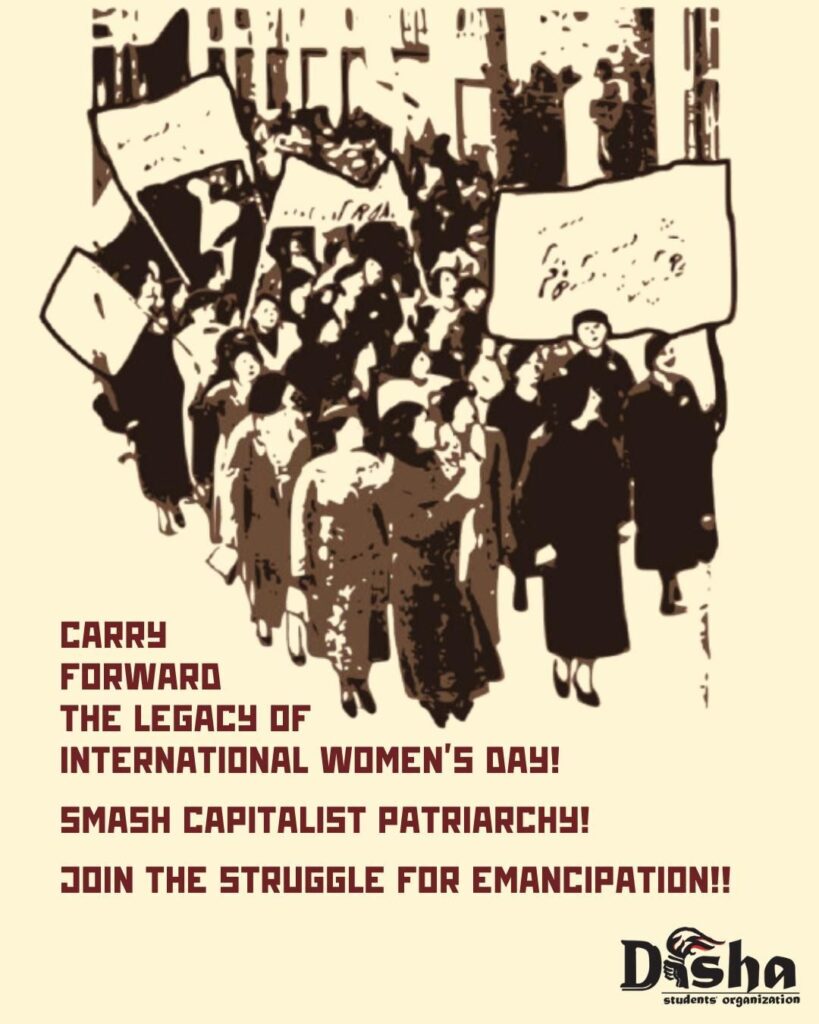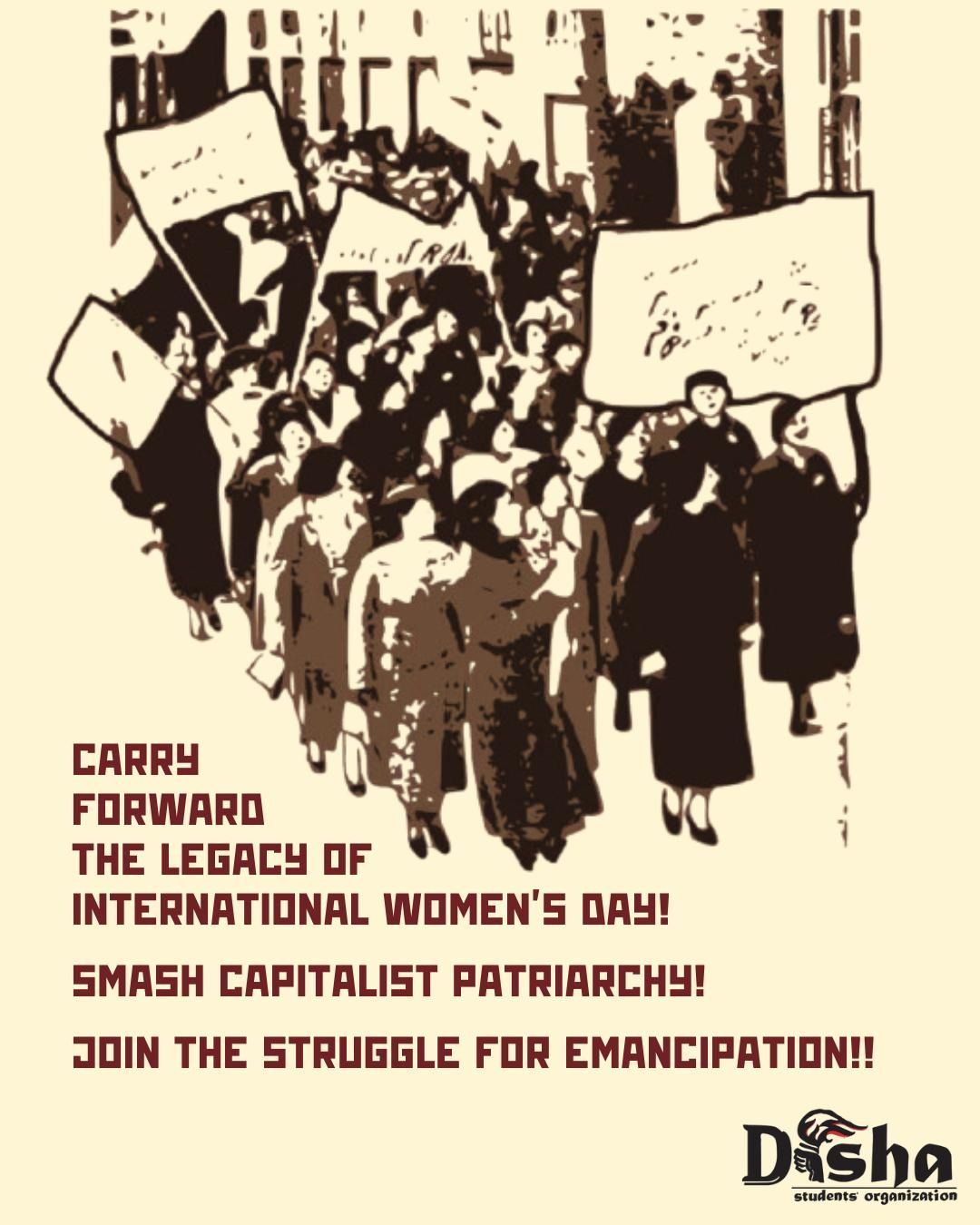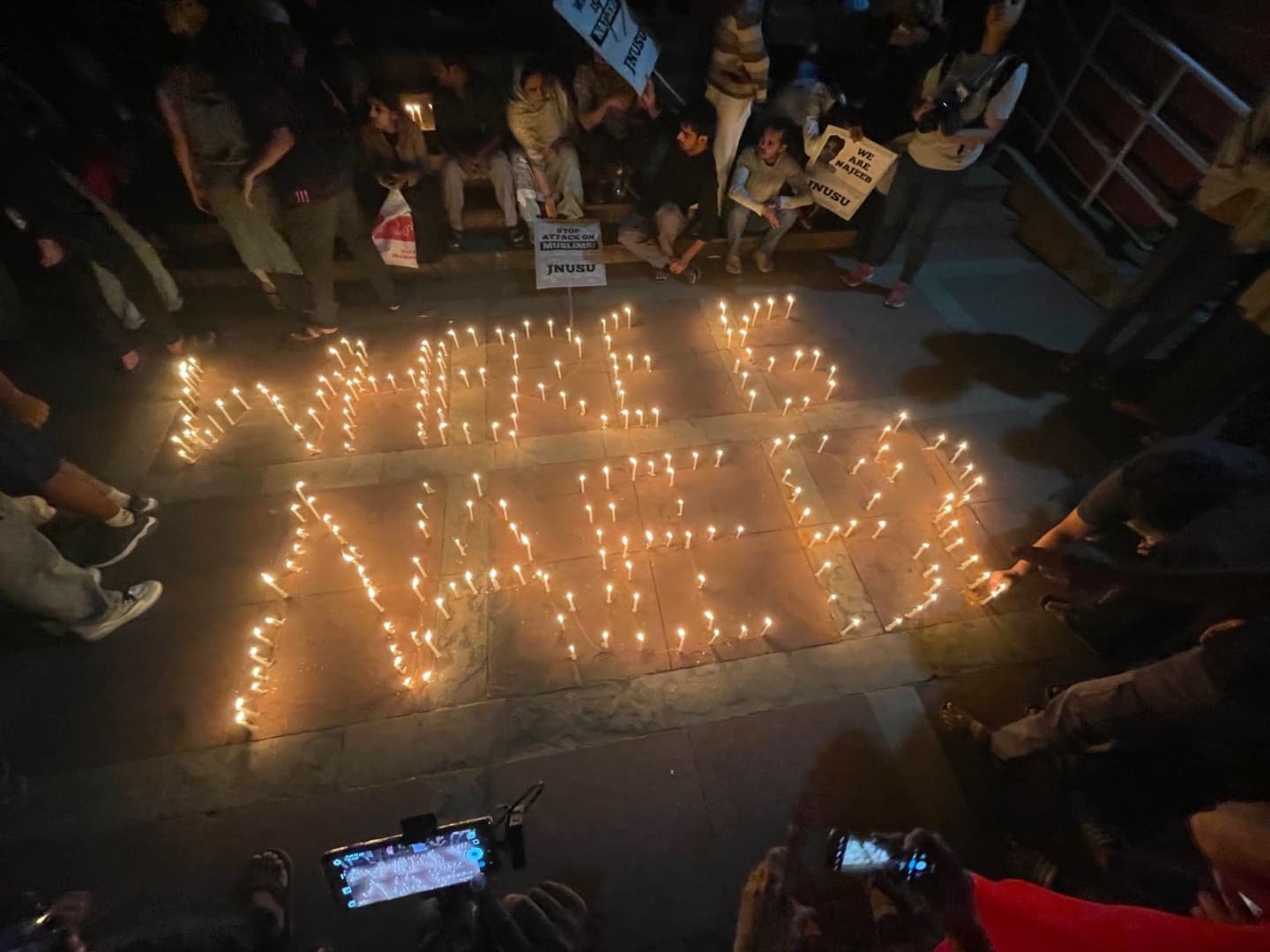Carry forward the legacy of International Women’s Day!
Smash Capitalist Patriarchy! Join the struggle for emancipation!!
March 8th is celebrated across the world as Women’s Day. However, it is increasingly becoming an empty ritual, as a holiday to pamper women or put them on a pedestal. For one day, we are told to forget the real, dismal conditions that women face in society and pretend that this is a system that does not exploit and oppress women. Is this enough? Is this the real spirit of women’s day? No! Women’s Day came into being out of the struggles of millions, and represents the worldwide fight for emancipation.
It was in 1910 at the International Women’s Conference that socialist leader Clara Zetkin proposed a day for celebrating the struggle of working women worldwide. The movement at the time was demanding for universal female suffrage, along with better working conditions, wages, and a revolutionary transformation of the very capitalist system that is perpetuating patriarchy. Borne out of the struggles of women in Europe and America, the day came to be celebrated worldwide. And it was a demonstration of women textile workers on March 8th in 1917 in Russia that set off the February Revolution which overthrew the despotic rule of the Tsar. They raised the slogan, “Bread and Peace”, demanding an end to the World War. The day of 8 March is thus historic, and a day to remember the struggles of thousands of women who fought for a better, more egalitarian society, who fought on the streets.It was not a passive movement, or one that simply appealed to the goodness of the rulers and hoped for change. These struggles understood that the state, and the ruling classes, were responsible for their exploitation and oppression, and launched a direct attack on the rulers with collective strength.
We see that more than a century later, while many rights have been won through struggle, there is a long way ahead. Violence against women is steadily rising. In our own country, the latest NCRB report states that there were 4,45,256 reported cases of crimes against women in 2022 alone. We know already that the vast majority of cases go unreported. Every other day a heinous incident comes to our notice. The safest city according to NCRB itself, Kolkata, was rocked by the RG Kar College rape and murder last year. The recent incident of rape in a bus depot in Pune is still fresh in our minds. Students in campuses are protesting and facing police repression for demanding safety, for functioning redressal and grievance committees. It is to be expected that violence against women will rise when fascists are at the helm. The BJP-RSS has an undefeated record in producing and glorifying rapists and harassers. From Ram Rahim to Kuldeep Singh Sengar, from Chinmayanand to Brij Bhushan Singh, the list is truly endless. The fascists protect these monsters, and even take out rallies in support of them. Suffice it to say that “Beti Bachao” is not a slogan but a warning.
It is not just the incidents of violence that make up patriarchy. It is pervasive in every fiber of our social and cultural lives. Many young women believe that if we try to focus on our career and gain economic independence, that is enough. But can an economically independent woman ever truly escape the patriarchy in the household or the workplace? And at the same time, can we ignore the fact that crores of women are spending 12 hours a day in tiny rooms, doing piecemeal work, the most brutal, mundane manual work that they are paid pennies for? And the women who are worked to the bone in fields? Or the women who come to the city and work as maids, helpers, waitresses? It is a grave blunder if we talk about women’s day and do not talk about the plight of the majority of women in our country.
Herein also lies the answer to the question, how does patriarchy benefit capitalism? By repeating that women are inferior, that women must look after the household, that they are objects to be used by men, the system finds a way to draw more profit for the rich. Women are paid less in virtually every single field, they are forced to do the unpaid work of running a household and looking after children and family (which would be the responsibility of the state or the capitalists otherwise), and media, culture industries make millions out of objectifying women.
Hence, it is essential to remember that it is not a few individual minds, a few disturbed men, who are the reason behind the condition of women, but rather that it is structurally embedded in a system that runs only for profit, without any moral or ethical considerations. Patriarchy today is different from how it functioned 100 or 200 years ago. For instance, many women can now join the workforce, but they are still condemned to household work in general. Patriarchal attitudes persist in new forms, the objectification of women’s bodies now operates for the market too.
How then do we fight this systemic evil? Patriarchy must be fought at the root. A major misconception that leads us into the pit of pessimism is that patriarchy is something inherent to humans since time immemorial. That it is innate to men and women to oppress or be oppressed. Many disturbing claims to biological factors are also made. But the truth lies in history. Patriarchy emerged at a very specific point in time in human civilisation. It emerged when humans went from a hand-to-mouth subsistence to a level where they were creating more than their need. This extra wealth that was generated then led to the question of ownership, and how ownership would pass down. In this context, determining the line of descent through the father led to the confinement and subjugation of women to the domestic sphere.
The particular biological conditions were not always oppressive by themselves, but rather at this juncture in civilisation, they were used to justify hierarchy. Patriarchy has served the interests of the ruling powers in different systems, from that early class society to slavery, from feudalism to capitalism. Today, capitalism has co-opted and moulded it to suit its needs. This is nothing but proof that patriarchy is not eternal or innate; it is a specific historical phenomenon that has adapted and evolved depending on which system is using it.
Can we then say patriarchy can be fought without addressing the system that engenders it? Would we treat only symptoms in any illness? This is why we must oppose reformist NGO politics which sell the myth that women should settle for whatever little they can get within this system. They harp on about awareness and changing mindset. They quell the anger in society and work to ensure that the movement does not seek solutions outside the limits of this system. They advocate to get women also some representation within this same system. Can that solve things? Does it matter that the CEO of PepsiCo is a woman? Does it mean anything for the peasant women in India who are being looted by the same Pepsi? Does it mean anything that Draupadi Murmu is the President or Nirmala Seetharaman is the Finance Minister? Does it mean the life of a woman worker is any different, that she gets better wages or a more secure workplace?
The entire logic of seeking representation as a solution is flawed, because it replaces the question of politics with identity. Being a woman does not mean one will automatically fight for the rights of all women, just as being a man does not mean they will oppress women. The question is about which political position one chooses and fights for, with an unrelenting attack on all instances of patriarchal behaviour, norm, be it internalised or external. We must fight against a system that will never treat all humans as equal. We must fight for a society that is not based on profit, but on fulfilling the needs of society. We must fight for a system that does not need to exploit and oppress women.
This fight is long, but it is the only way for real, complete emancipation of women, and we must settle for nothing less. We must fight for every right we can achieve in this system, remembering our ancestors who paved the way, and turn them into stepping stones towards the long-term goal of revolutionary transformation of society. The movements that took place across history, and the significance of today’s date, are testament to the fact that only our collective struggle can pave this path, and there is no room for passivity or silence in struggle.





